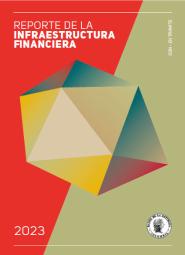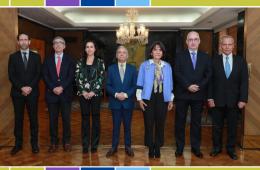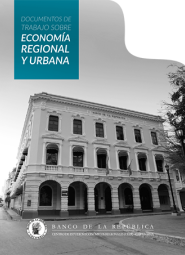The Board of Directors of the Banco de la República unanimously voted to maintain the monetary policy interest rate unchanged at 13.25%
- Annual inflation in June stood at 12.1%, one percentage point below that recorded in December 2022. The decrease in inflation has slowed the pace of inflation expectations. The survey of economic analysts for July showed that, according to the sample median, inflation expectations for the 12- and 24-month forward horizon currently stand at 6.0% and 3.9%, respectively. Furthermore, inflation expectations derived from the government debt securities (TES) market for the two- and five-year ahead horizons, controlling for liquidity and inflationary premium risks, stand at between 5.6% and 4.6%.
- Despite these improvements, inflation levels and expectations continue to surpass the target, as seen in the inflation expectation for 2024, which stands at 5.0%. In addition, the steadfast position of core inflation (excluding food and regulated items) persists, which stood at an annual 10.5% in June, a level similar to that observed in the preceding months. Indexation processes continue, which helps to explain this behavior.
- •The economic monitoring indicator (ISE) for April and May, as well as the latest industry and trade survey, suggest that the slowdown in economic activity in the second quarter would have been greater than expected. Consequently, the technical staff slightly reduced its growth forecast for 2023 from 1% to 0.9%, placing it at a level below those of most economic analysts. Moreover, the expectation for 2024 was revised slightly upwards, from 0.9 to 1%. Although these increments appear small, they align with historically high product levels that reflect marginal variations of significant GDP expansions that occurred in 2021 and 2022.
- Despite showing signs of a possible slowdown, the labor market continues to perform well. This was supported by the latest DANE labor market report, which noted a fall in the national aggregate unemployment rate in June to 9.3%, and 8.8% for the thirteen main cities.
- Credit growth has slowed. In mid-July, the total loan and consumption portfolio grew at annual rates of 9% and 5% respectively, rates considerably lower than those observed to September 2022. A relative worsening in the quality of the loan portfolio has occurred, mainly in consumption. Nevertheless, credit institutions maintain high levels of capital and a sound liquidity position, acting within the framework of a regulatory system that upholds high international standards.
- The Colombian peso has continued to appreciate, returning to levels not seen since mid-2022. The appreciation of the peso has occurred against a backdrop of lower country risk premiums, to a far greater degree than those observed in other regional economies.
In their policy discussion, the directors weighed the positive recent behavior of inflation and other macroeconomic variables against those that remain a cause for concern.
Among the first, the directors highlighted the downward path of consumer price inflation seen in the past three consecutive months and highlighted the sharp drop in producer price inflation that underlines a reduction in the growth rate of production costs. They stressed that inflation expectations for various forward-looking periods have continued to decrease, including for yearend 2023. They also highlighted the remarkable appreciation of the peso in recent months, which they associate with positive risk level signals, which they considered favorable for the deflationary process and convergence to the inflation target. They emphasized that the lower growth of credit and monetary aggregates reinforce the downward adjustment in the excess aggregate demand. Likewise, they underlined the progress made in reducing the current account of the balance of payments, to head it toward more sustainable levels. They underscore the National Government's purpose to reduce its fiscal deficit by one GDP point in 2023. They stressed that, despite the slowdown in economic activity so far this year, the labor market remains strong. The directors emphasize that these favorable indicators reaffirm the strength of the financial system, despite the deterioration in the quality of the loan portfolio associated with the slowdown in economic activity and high interest rates. Financial regulation in Colombia, following the highest international standards, plays an important role in this regard, and they emphasized there is no dilemma between price stability and financial stability.
As for the factors that remain a cause for concern, the directors highlighted that, despite the fall in inflation during the past three months, it continues to register a significantly high level, relative to that observed both in the main advanced economies and in comparable Latin American economies. They caution that they have not begun to observe in Colombia a reduction of the customary indicator of core inflation, defined as the CPI basket excluding food or regulated items, which to June remained at a level of 10.5%, the highest in this century. They stressed that inflation expectations for various forward-looking periods continue at levels well above the 3% target despite recent decreases. They noted the risks associated with future movements of the exchange rate, given the global and local uncertainty that prevails. They mentioned the concerns about the potential effects the El Niño phenomenon may have on food and energy prices, as well as new shocks arising from the possible escalation of the conflict in Ukraine and the expiration of deals allowing the export of grains and other agricultural products from this region. They pointed out that the increases in fuel prices, required to close the deficit resulting from their prolonged stagnancy, will continue to drive up the regulated basket and inflation in general. In this regard, they indicated the food inflation decline has so far offset the higher inflation for regulated items, but the effects of El Niño or the war in Ukraine could potentially reverse this achievement, in an environment in which core inflation continues unyielding. Thus, they underscored that the fight against inflation is not over, and thus agreed on the need to maintain the current restrictive monetary policy stance until they see definitive signs of convergence of inflation towards its target.
After a conscientious risk assessment, the directors unanimously agreed to keep the policy interest rate unchanged. At the same time, they insisted that the successive decisions taken by the Board will be determined according to new information available.




















































